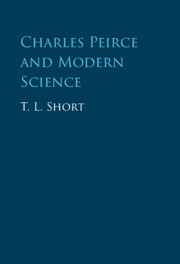Book contents
- Charles Peirce and Modern Science
- Charles Peirce and Modern Science
- Copyright page
- Dedication
- Contents
- Preface
- Acknowledgments
- A Note on Citation of Sources
- Chapter 1 Peirce’s Life in Science: 1859–1891
- Chapter 2 Peirce’s Concept of Science
- Chapter 3 Modern Science Contra Classical Philosophy
- Chapter 4 The Meaning of Pragmatism
- Chapter 5 Misleading Appearances of System
- Chapter 6 Devolution of the Cosmogonic Program
- Chapter 7 Experiments Expanding Empiricism
- Chapter 8 Phaneroscopy and Realism
- Chapter 9 Normative Science
- Chapter 10 Modern Science Contra Modernity
- Bibliography
- Index
Chapter 4 - The Meaning of Pragmatism
Published online by Cambridge University Press: 26 October 2022
- Charles Peirce and Modern Science
- Charles Peirce and Modern Science
- Copyright page
- Dedication
- Contents
- Preface
- Acknowledgments
- A Note on Citation of Sources
- Chapter 1 Peirce’s Life in Science: 1859–1891
- Chapter 2 Peirce’s Concept of Science
- Chapter 3 Modern Science Contra Classical Philosophy
- Chapter 4 The Meaning of Pragmatism
- Chapter 5 Misleading Appearances of System
- Chapter 6 Devolution of the Cosmogonic Program
- Chapter 7 Experiments Expanding Empiricism
- Chapter 8 Phaneroscopy and Realism
- Chapter 9 Normative Science
- Chapter 10 Modern Science Contra Modernity
- Bibliography
- Index
Summary
This chapter examines what was most constant in Peirce’s thought albeit constantly developing. He was always an idealist but not always in the same way. His early embrace of scholastic realism deepened over time so as to include triadic relations and the recognition that these entail modal realism. Modal realism affirms the irreducible meaningfulness of subjunctive conditionals, hence, the reality of what would be and what would have been. In his initial 1878 statement of what came to be called ’the pragmatic maxim’ (not a theory of meaning but a prescription for growth in meaning, that is, ’clarification’), Peirce explicitly denied modal realism. But that maxim requires the meaningfulness of modal locutions, for which nonetheless it cannot account. The resulting problems (e.g., that of ’buried secrets’) were resolved in 1903 by a revised maxim that added a Lockean dimension of meaning to the pragmatic dimension – an addition not heretofore recognized.
Keywords
Information
- Type
- Chapter
- Information
- Charles Peirce and Modern Science , pp. 65 - 94Publisher: Cambridge University PressPrint publication year: 2022
